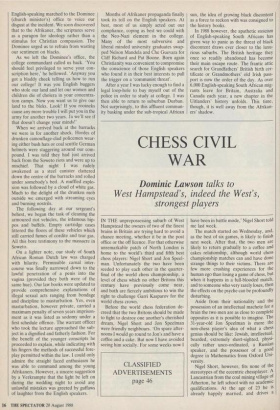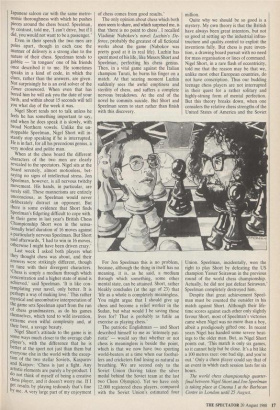CHESS CIVIL WAR
Dominic Lawson talks to
West Hampstead's, indeed the West's, strongest players
IN THE unprepossessing suburb of West Hampstead the owners of two of the finest brains in Britain are trying hard to avoid a chance meeting, whether it be in the post office or the off licence. For that otherwise unremarkable patch of North London is home to the world's third and fifth best chess players: Nigel Short and Jon Speel- man. Unfortunately the two have been seeded to play each other in the quarter- final of the world chess championship, a level of chess which no other Britons this century have previously come near, and both are fiercely ambitious to win the right to challenge Garri Kasparov for the world chess crown.
Before the world chess federation de- creed that the two Britons should be made to fight to destroy one another's cherished dream, Nigel Short and Jon Speelman were friendly neighbours. 'On spare after- noons I would go round to Jon's and have a coffee and a cake. But now I have avoided seeing him socially. For some weeks now I have been in battle mode,' Nigel Short told me last week.
The match started on Wednesday, and, as the best of six games, is likely to finish next week. After that, the two men are likely to return gradually to a coffee and cakes relationship, although world chess championship matches can and have done strange things to their victims. There are few more crushing experiences for the human ego than losing a game of chess, but when it happens in a full-blooded match, and to someone who very rarely loses, then the effects on the psyche can be profoundly disturbing. Aside from their nationality and the possession of an intellectual machete for a brain the two men are as close to complete opposites as it is possible to imagine. The 31-year-old Jon Speelman is more the non-chess player's idea of what a chess genius should be like: Jewish, intellectual, bearded, extremely short-sighted, physi- cally rather unco-ordinated, a Russian speaker, and the possessor of a good degree in Mathematics from Oxford Uni- versity. Nigel Short, however, fits none of the stereotypes of the eccentric chessplayer. A Lancastrian from the coal mining village of Atherton, he left school with no academic qualifications. At the age of 23 he is already happily married, and drives a Japanese saloon car with the same metro- nomic thoroughness with which he pushes pieces around the chess board. Speelman, by contrast, told me, 'I can't drive, but if I did, you would not want to be a passenger.'
Even in their speech the two men are poles apart, though in each case the manner of delivery is a strong clue to the nature of their chess. Speelman tends to gabble — 'in tongues' one of his friends once described it to me. He sometimes speaks in a kind of code, in which the clues, rather than the answers, are given. Not surprisingly he is an avid solver of the Times crossword. When even that has bored him he will ask you the date of your birth, and within about 15 seconds will tell you what day of the week it was.
Nigel Short tends not to talk unless he feels he has something important to say, and when he does speak it is slowly, with broad Northern vowels. Unlike the un- stoppable Speelman, Nigel Short will in- stantly stop speaking if he is interrupted. He is in fact, for all his precocious genius, a very modest and polite man.
When at the chess board the different characters of the two men are clearly revealed to the spectators. Nigel sits at the board serenely, almost motionless, bet- raying no signs of intellectual stress. Jon Speelman, however, is all nervous twitchy movement. His hands, in particular, are rarely still. These mannerisms are entirely unconscious, as Speelman would never deliberately distract an opponent. But there is some evidence that Short finds Speelman's fidgeting difficult to cope with. In their game in last year's British Chess Championship Short won in the sensa- tionally brief duration of 16 moves against a particularly nervous Speelman. But Short said afterwards, 'I had to win in 16 moves, otherwise I might have been driven crazy.' Last week I asked both players what they thought chess was about, and their answers were strikingly different, though in tune with their divergent characters. Chess is simply a medium through which Concentration and a higher state of mind is achieved,' said Speelman. 'It is like con- templating your navel, only better. It is perhaps a way of making love.' This rather mystical and uncombative interpretation of the game sets Speelman apart from the run of chess grandmasters, as do his games themselves, which tend to wild invention, extreme even wilful complexity and, at their best, a savage beauty. Nigel Short's attitude to the game is in some ways much closer to the average club player's, with the difference that he is better at the sport not just than them but everyone else in the world with the excep- tion of the two stellar Soviets, Kasparov and Karpov: 'Chess is just a fight. Any artistic elements are purely a by-product. I do not think of myself of being a creative chess player, and it doesn't worry me. If I get results by playing tediously that's fine by me. A very large part of my enjoyment of chess comes from good results.'
The only opinion about chess which both men seem to share, and which surprised me, is that 'there is no point to chess'. I recalled Vladimir Nabokov's novel Luzhin's De- fence, probably the greatest of all fictional works about the game (Nabokov was pretty good at it in real life). Luzhin has spent most of his life, like Messrs Short and Speelman, perfecting his chess genius. Then, in a vital game against the Italian champion Turati, he burns his finger on a match. At that searing moment Luzhin suddenly sees the awful emptiness and sterility of chess, and suffers a complete nervous breakdown. At the end of the novel he commits suicide. But Short and Speelman seem to start rather than finish with this discovery.
For Jon Speelman this is no problem, because, although the thing in itself has no meaning, it is, as he said, a medium through which something, some other mental state, can be attained. Short, rather bleakly concludes (at the age of 23) that `life as a whole is completely meaningless. You might argue that I should give up chess and become a relief worker in the Sudan, but what would I be saving those lives for? That is probably as futile an exercise as playing chess.'
The patriotic Englishman — and Short described himself to me as 'intensely pat- riotic' — would say that whether or not chess is meaningless is beside the point, which is that we now have two sporting world-beaters at a time when our footbal- lers and cricketers find losing as natural as breathing. We are second only to the Soviet Union (having taken the silver medal behind the Soviet team at the last two Chess Olympics). Yet we have only 12,000 registered chess players, compared with the Soviet Union's estimated four million.
Quite why we should be so good is a mystery. My own theory is that the British have always been great intentors, but not so good at setting up the industrial infras- tructure and quality control to exploit the inventions fully. But chess is pure inven- tion, a drawing board pursuit with no need for mass organisation or lines of command. Nigel Short, in a rare flash of eccentricity, told me that the reason may be that we, unlike most other European countries, do not have conscription. Thus our budding teenage chess players are not interrupted in their quest for a rather solitary and highly-strung form of mental perfection. But this theory breaks down, when one considers the relative chess strengths of the United States of America and the Soviet Union. Speelman, incidentally, won the right to play Short by defeating the US champion Yasser Seirawan in the previous round of the world chess championship. Actually, he did not just defeat Seirawan,' Speelman completely destroyed him.
Despite that great achievement Speel- man must be counted the outsider in his match against Short. Although their life- time scores against each other only slightly favour Short, most of Speelman's victories came when Nigel was no more than a boy, albeit a prodigiously gifted one. In recent years Nigel has handed some severe beat- ings to the older man. But, as Nigel Short points out, 'This match is only six games, so it cannot help but be close. It's a bit like a 100 metres race: one bad slip, and you're out.' Only a chess player could say that of an event in which each session lasts for six hours.
The world chess championship quarter- final between Nigel Short and Jon Speelman is taking place at Cinema 1 at the Barbican Centre in London until 25 August.























































 Previous page
Previous page